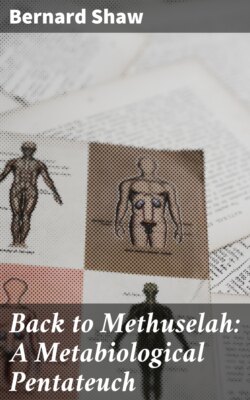Читать книгу Back to Methuselah: A Metabiological Pentateuch - Bernard Shaw - Страница 20
На сайте Литреса книга снята с продажи.
HEREDITY AN OLD STORY
ОглавлениеTable of Contents
It is evident that the evolutionary process is a hereditary one, or, to put it less drily, that human life is continuous and immortal. The Evolutionists took heredity for granted. So did everybody. The human mind has been soaked in heredity as long back as we can trace its thought. Hereditary peers, hereditary monarchs, hereditary castes and trades and classes were the best known of social institutions, and in some cases of public nuisances. Pedigree men counted pedigree dogs and pedigree horses among their most cherished possessions. Far from being unconscious of heredity, or sceptical, men were insanely credulous about it: they not only believed in the transmission of qualities and habits from generation to generation, but expected the son to begin mentally where the father left off.
This belief in heredity led naturally to the practice of Intentional Selection. Good blood and breeding were eagerly sought after in human marriage. In dealing with plants and animals, selection with a view to the production of new varieties and the improvement and modification of species had been practised ever since men began to cultivate them. My pre-Darwinian uncle knew as well as Darwin that the race-horse and the dray-horse are not separate creations from the Garden of Eden, but adaptations by deliberate human selection of the medieval war-horse to modern racing and industrial haulage. He knew that there are nearly two hundred different sorts of dogs, all capable of breeding with one another and of producing cross varieties unknown to Adam. He knew that the same thing is true of pigeons. He knew that gardeners had spent their lives trying to breed black tulips and green carnations and unheard-of orchids, and had actually produced flowers just as strange to Eve. His quarrel with the Evolutionists was not a quarrel with the evidence for Evolution: he had accepted enough of it to prove Evolution ten times over before he ever heard of it. What he repudiated was cousinship with the ape, and the implied suspicion of a rudimentary tail, because it was offensive to his sense of his own dignity, and because he thought that apes were ridiculous, and tails diabolical when associated with the erect posture. Also he believed that Evolution was a heresy which involved the destruction of Christianity, of which, as a member of the Irish Church (the pseudo-Protestant one), he conceived himself a pillar. But this was only his ignorance; for man may deny his descent from an ape and be eligible as a churchwarden without being any the less a convinced Evolutionist.
